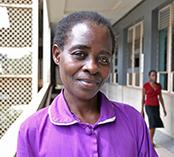
Today is World Humanitarian Day, a day designated by the United Nations General Assembly to honor those who face danger in order to help others.
Heath workers, of course, are humanitarians. They not only risk contracting infectious disease and illness when providing care but they continue to be threatened and harmed just for doing their jobs—trying to save lives.
The Safeguarding Health in Conflict Coalition, an alliance of over 30 organizations, works to protect health workers, services, and infrastructure from violence during times of armed conflict and civil unrest. The coalition’s recent report [link] with Human Rights Watch shows that at least 20 countries January 2014 experienced attacks against health. Such violence has not only obstructed safe and reliable access to health services, but also poses a long-term challenge to the effective operation of health systems even once stability returns.
In just the last week, an ambulance was attacked in Yemen, airstrikes hit on or near nine hospitals in Syria, and hospitals were reported still in shambles after the last Gaza offensive.
The coalition is celebrating health worker humanitarians around the world, but today we also revisit the need to protect health workers from violence.
In May 2016, the United Nations Secretary General will convene the first-ever World Humanitarian Summit, and will emphasize the needs of people in conflict affected states as one of its four thematic areas.
The coalition commends this effort and submitted the following recommendations to prioritize accountability for violation of human rights and humanitarian laws and to ensure up-to-date reporting on the scope, scale and severity of attacks worldwide:
- Recognize and articulate the imperative of protecting local health workers and facilities, and consider how strategies designed to protect foreign humanitarian staff may differ from those needed for the protection of these local groups.
- Articulate support for strengthening global health, human rights law and accountability mechanisms for monitoring and reporting, and ensuring accountability for attacks against health care in these contexts.
- Identify violence against health care in non-conflict settings as an important consideration in this thematic discussion and WHS more broadly.
Actions taken by the United Nations and World Health Organization in recent years have helped create momentum to address violence against health care. Nonetheless, despite the increasing severity of attacks worldwide, the international community has been slow to urge for compliance with the law, assess and report on violations in a systematic way, and recognize the protection of health care as a central global health and humanitarian priority.
The World Health Summit leadership in addressing these concerns can help generate the global awareness, commitments and action we need to ensure safe and reliable health service delivery is guaranteed for everyone, everywhere.
The coalition urges the global community not to overlook the need to protect health workers on World Humanitarian Day or during the World Humanitarian Summit.

